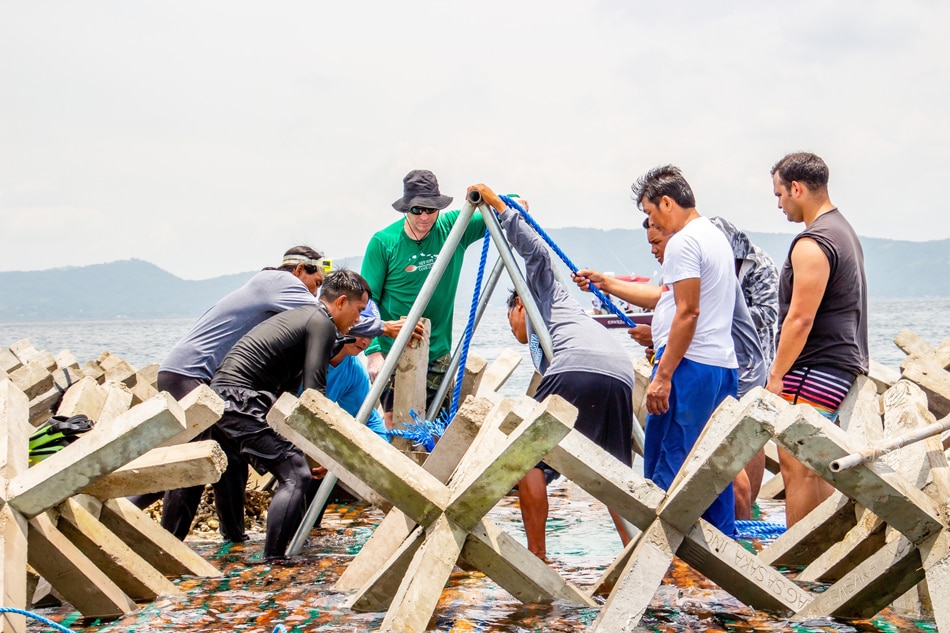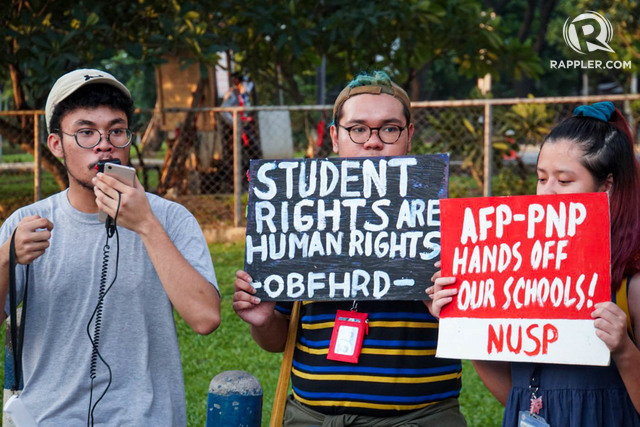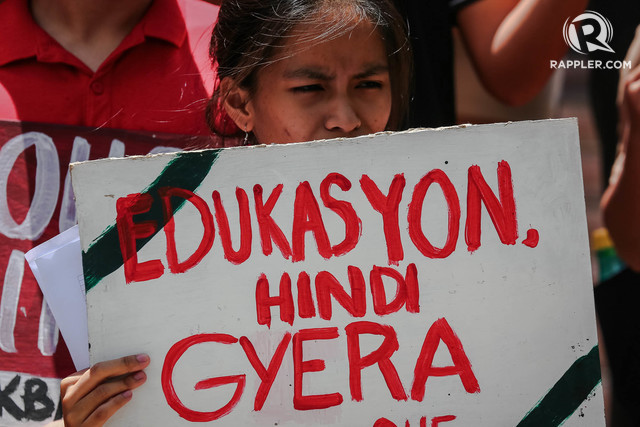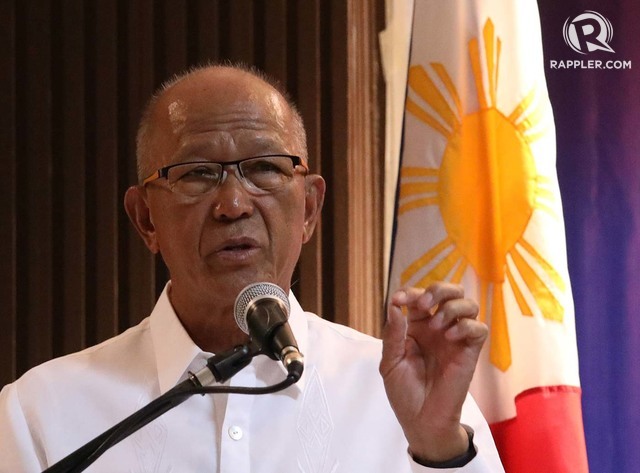Posted to the Manila Bulletin (Aug 16, 2019):
The Philippine-Indonesian Partnership for Peace in Muslim Mindanao (By Jamil Maidan Flores)
When the Organization of the Islamic Conference (OIC), a grouping of some 55 Muslim states, held its Fifth Islamic Conference of Foreign Ministers (ICFM) in Kuala Lumpur, Malaysia, the fate of the Philippines hung in the balance.
It was 21 June 1974. The Moro separatist rebellion was an unbridledinferno. Nur Misuari, chairman of the still undivided Moro National Liberation Front (MNLF), had reason to be confident that the meeting would heftily boost his separatist cause. He had sought admission of the MNLF as state member of the OIC and in this he had the fierce support of several Middle Eastern powers, notably Libya and Saudi Arabia.
 (L-R) Hamid Algabid, Secretary-General of the Organization of the Islamic Conference; Ambassador Manuel T. Yan, Chairman of the GRP Negotiating Panel; former president Fidel V. Ramos; MNLF Chairman Nur Misuari; Indonesian Foreign Minister Ali Alatas (Office of FVR / MANILA BULLETIN)
(L-R) Hamid Algabid, Secretary-General of the Organization of the Islamic Conference; Ambassador Manuel T. Yan, Chairman of the GRP Negotiating Panel; former president Fidel V. Ramos; MNLF Chairman Nur Misuari; Indonesian Foreign Minister Ali Alatas (Office of FVR / MANILA BULLETIN)
A case could be objectively made for MNLF statehood: it controlled and administered territory: some ten towns in Cotabato that the Front had seized in theblitz of 1973, several islands in the Sulu-Tawi-Tawi archipelago, and a few towns on Jolo island. Earlier that year, in February, the MNLF fought the Philippine military in a bloody battle that leveled Jolo town.
On top of that, the oil-producing Muslim countries imposed an oil embargo on the United States and other countries they regarded as close to Israel, including the Philippines. This not only hamstrung Philippine industrial production, it also impeded military operations against the rebels.
As if these were not enough for the Philippine government to worry about, the Secretary General of the OIC at that time was Tengku Abdul Rahman, the first Malaysian prime minister to tangle with the Philippines on the issue of sovereignty over Sabah. Tom Stern, the biographer of Nur Misuari, claims that in 1968 in the wake of the Jabidah Massacre, the Tengkuhad offered to train, arm and finance 10,000 Moro fighters to do battle against the Philippine Government.
This writer has found no corroboration to the assertion that the Tengkumade this offer personally. It is a fact of history, however, that in 1971, a batch of 90 Moro fighters, including Nur Misuari, were trained in guerilla warfare for one year on Pangkor Island in West Malaysia, presumably as retaliation to Operation Merdeka, the Marcos government plot to send commandos to sow mayhem in Sabah and soften the territory for a possible invasion. A major sponsor to this training was TunMustapha bin Harun, the Tausug-born Chief Minister of Sabah, while Lanao del Sur Congressman Rashid Lucman coordinated recruitment on the Philippine side. Later hundreds more were trained in Sabah and Libya. While undergoing guerilla warfare training on Pangkor Island, Nur Misuariconceptualized and organized the core of the Moro National Liberation Front (MNLF). (See Tom Stern, “Misuari, An Authorized Biography,” p.141-145.)
By the time that the Moro rebellion broke out in late 1972, Nur Misuari, having cast off the influence of Rashid Lucman, commanded an estimated force of 50,000 Moro fighters, many of them armed with the best assault rifles that Libyan money could buy.
Thus Misuari went into the Fifth OIC-ICFM perhaps dreaming that he would soon be head of state. What he did not know was that Malaysia had changed its mind about the MNLF. The Malaysian central government had suddenly discovered that Tun Mustapha, who was of Filipino bloodline, had a separatist yearning of his own, one that involved a merger of Sabah and southern Philippines. Malaysia dropped the MNLF like a hot potato.
Enter Adam Malik
And what Misuari did not expect was that an icon of Indonesian diplomacy would seal the fate of his separatist ambitions. Adam Malik was only five feet four but he was a giant of international affairs, having just completed tenure as President of the UN General Assembly. He was one of a triumvirate that ruled Indonesia when founding PresidentSukarno was ousted in 1966, the other two being acting President Suharto and Yogyakarta Sultan Hamengku Buwono IX.
As the triumvir in charge of foreign affairs, he was signatory to the Bangkok Declaration, the ASEAN founding document, in August 1967 along with the foreign ministers of Malaysia (Deputy Prime Minister Tun Abdul Razak, father of immediate ex-PM Najib Razak), the Philippines (Narciso Ramos, father of former President Fidel), Thailand (Thanat Khoman) and Singapore (S. Rajaratnam).
In the Non-aligned Movement, to which all OIC members also belonged, Adam Malik enjoyed celebrity status.Hence, when he argued against the MNLF bid for OIC membership, his words carried tremendous weight. Nobody knows the exact words he used but in effect he must have told the conference: if you violate the sovereignty of the Philippines by accepting the MNLF into OIC membership as an Islamic state, you would be making this fratricidal strife in southern Philippines even more bloody and perverse. You would be compromising the security of an entire region and the world itself.
To Malaysia and the Philippines, he urged both to strive for a just solution “within the framework of the national sovereignty and territorial integrity of the Philippines.” He advised both countries “to pay more attention to the promotion of regional solidarity and unity rather than the pursuit of ‘narrow’ national interests that might jeopardize the stability of ASEAN.” He made it clear that it was not only the fate of the Philippines that hung in the balance, the future of a fledgling ASEAN was also at risk.
Moreover, Adam Malik met with key Arab foreign ministers and strongly lobbied against the MNLF bid for OIC membership. Fortunately for the Philippines, for ASEAN and for the cause of peace, he was able to persuade them. And by the time the conference concluded on 24 June 1974, the OIC had passed Resolution No. 18, which called on the Philippine Government and the MNLF to negotiate toward autonomy within the framework of Philippine sovereignty and territorial integrity. (See Anak Agung Banyu Perwita, “Indonesia and the Muslim World: Islam and Secularism in the Foreign Policy of Soeharto and Beyond,” p. 111-114.)
Malaysia now part of the solution
Resolution No. 18 was a Malaysian-crafted document, which meant that Malaysia was no longer part of the problem created in the first place by Marcos’s military adventurism (Operation Merdeka), but an important contributor to the solution. In the years ahead, Malaysia would play an increasingly constructive role in the search for a solution to the Moro problem.
Meanwhile Indonesia continued to support the Philippine government’s efforts toward peace in Muslim Mindanao. At OIC conferences where Philippine representatives were not allowed to attend, the Indonesian delegation, after every session, would brief Filipino diplomats on what transpired in the meeting. Indonesia also continued to encourage the MNLF to agree to a political solution, to the extent that at one time, according to the official biography of Misuari, President Suharto met him in Manado in 1974 and urged him outright to settle for autonomy.
The mandate of Resolution No. 18 led to the signing of the Tripoli Agreement of 1976, which conferred autonomy on the Muslims of Southern Philippines. This was a framework agreement that would be fleshed out with the modalities of its implementation in subsequent negotiations between the Philippine Government and the MNLF.
To many MNLF members, anything less than independence was anathema. In 1978, Misuari’s own vice-chairman, Hashim Selamat, parted ways with him on this issue. Salamat would go on to found the Moro Islamic Liberation Front
(MILF), which would grow larger than the mother organization. The OIC, however, would unswervingly continue to recognize Misuari as the sole legitimate representative of the Moro people.
After the signing of the Tripoli Agreement, there followed a period during which it was essentially unimplemented in spite of the efforts of President Marcos, and after him, of President Corazon C. Aquino, to fulfill aspects of the Agreement in their own way. During that period the violence of the Moro rebellion abated as the MNLF further splintered and many of its field commanders, like Abul Khayr Alonto of Lanao and Amelil Malaguiok of Cotabato, were co-opted by the government. But the modalities of the implementation of the Tripoli Agreement had yet to be fleshed out.
Indonesia called upon to help
In 1993 the OIC Secretariat called upon Indonesia to lead the OIC Ministerial Committee that was tasked with addressing the Muslim Mindanao issue. Meanwhile, Fidel V. Ramos had succeeded to the presidency and sought resumption of negotiations. Responding to the request of both the Philippine Government and the MNLF to mediate the negotiations on behalf of the OIC, Indonesia buckled down to the task.
From 1993 to 30 August 1996, a team of top-rate Indonesian diplomats shepherded the peace talks between the Government of the Republic of the Philippines (GRP) and the MNLF in Jakarta. Foreign Minister Ali Alatas, imbued the process with wisdom gained from decades of experience as international negotiator. Ambassador Wiryono Sastrohandoyo patiently moderated the formal peace talks, which often bubbled with the tantrums of Nur Misuari. At the level of the Mixed Committee, which tackled and resolved all contentious issues, a very young Dr. Hassan Wirajuda, destined to one day become foreign minister, steered discussions.
By the time, that the Final Peace Agreement was signed between the GRP and the MNLF at Malacanang Palace in Manila on 02 September 1996, Nur Misuari had agreed to run unopposed for ARMM Governor and to head the Southern Philippines Council for Peace and Development (SPCPD), which would be the equivalent of the Transitional Implementing Structure and Mechanism stipulated in the Tripoli Agreement. Thus Nur Misuari had power and control over the autonomous regional government, and Muslim Mindanao was effectively under MNLF administration. But his revolutionary temper did not dovetail into his role as administrator.
After six years at the helm of the ARMM, Misuari had been charged with corruption, accused of leading a rebellion in Jolo, and ousted from the MNLF chairmanship by 15 of his own lieutenants on grounds of incompetence. On 22 November 2001, Misuari fled to Sabah where he was promptly arrested by the Malaysian authorities who turned him over to their Philippine counterparts. For years Misuari languished under detention while other Moro leaders managed the operations of the ARMM.
For the MILF, a separate peace
Soon after the signing of the 1996 FPA, negotiations were launched between the Philippine government and the MILF. This would be a long, drawn-out process that would last 17 years and involve four Presidents. It would be interrupted by an all-out war waged by President Joseph Estrada against the MILF, and resumed by President Gloria Macapagal Arroyo after seeking and obtaining the agreement of Malaysia to mediate the process. Malaysia would be mediating as an individual country, not on behalf of the OIC. The Arroyo Government would reach a deal with the MILF—the Memorandum of Agreement on Ancestral Domain (MOA-AD). The Supreme Court, however, would strike this down as unconstitutional.
In February 2011, Arroyo’s successor, Benigno S. Aquino III, revived the peace process, still utilizing Malaysian mediation. The ensuing negotiations yielded in 2014 a Comprehensive Agreement on the Bangsamoro (CAB), which became the basis for the drafting of the Bangsamoro Basic Law (BBL). However, the BBL got stuck in Congress over questions of its constitutionality. In January 2015 when 44 police commandos were killed in Mamasapano, Maguindanao in a mis-encounter with MILF fighters, the BBL ran aground altogether.
Meanwhile, another vitally important process was underway on the MNLF side. In November 2007, the OIC formed the Peace Committee for Southern Philippines (PCSP), in which 11 of its members were represented. This move was taken because the Philippine Government had been reporting to the OIC that the implementation of at least Phase I of the FPA had been essentially completed, while the MNLF maintained that it had not been implemented at all.
The OIC then proposed that panels of the Philippine Government and the MNLF sit together with the OIC to review the actual progress in the implementation of the FPA. Once again, Indonesia was tapped to head this delicate process. A veteran of Indonesia’s reconciliation talks with Timor-Leste, Ambassador Rezlan Jenie, chaired the Tripartite Implementation Review of the FPA.
In the course of this review, Joint Working Groups (JWGs) were tasked to provide recommendations on how to move forward the implementation of the FPA. Later this mandate was expanded to include the formulation of proposed amendments to Republic Act 9054, the enabling law of the FPA.
To carry out its work the Peace Committee met in various places over a period of almost nine years: first in Jeddah, Saudi Arabia, then in Istanbul, Turkey, then in Pasay City, Philippines, then in Jeddah again, and then in Bandung, Indonesia in March 2012. During all this time, the review process was able to resolve 42 of 43 points of concern raised by the MNLF.
Finally on 26 January 2016 in Jeddah, Saudi Arabia the Government of the Philippines (GPH), the MNLF and the OIC signed a Joint Communiqué that concluded the Tripartite Review Process.
A convergence of two peace processes
Among other things, the Joint Communiqué provided for the participation of the MNLF in the Bangsamoro Transition Authority (BTA), the envisioned parliament of the Bangsamoro. It also provided for the implementation of the 42 points of consensus on the concerns raised by the MNLF during the review. These 42 points of consensus were to be integrated into the Bangsamoro Basic Law along with the provisions of Comprehensive Agreement on the Bangsamoro, which was negotiated between the Philippine government and the MILF. In that light, there was a convergence of the two peace processes in southern Philippines, the GRP-MNLF peace process and the GPH-MILF peace process. When the Joint Communiqué was signed, these two, in effect, became one.
This convergence took place just before the completion of the tenure of President Benigno S. Aquino III, and the ascension of Rodrigo R. Duterte to the presidency. Under President Duterte, a process was launched to draft a new Bangsamoro Basic Law that would “combine all the virtues of earlier peace agreements and remove all their infirmities” through the work of a Bangsamoro Transition Commission, in which, this time, a much wider range of stakeholders were represented. Three major factions of the MNLF were represented in that Commission.
The rest is contemporary history: under President Duterte, the convergence of the MNLF-MILF peace processes was maintained and strengthened. The expanded Bangsamoro Transition Commission (BTC) submitted a new BBL to the President who passed it on to Congress, which in turn deliberated on the BTC proposal and passed the legislation called Bangsamoro Organic Law (BOL). The concerns of the MNLF were addressed in that legislative process.
On 26 July 2018, President Duterte signed the BOL into law, and on 21 January this year, the electorate of the Autonomous Region in Muslim Mindanao (ARMM) approved it in a plebiscite. As a result of the 21 January Plebiscite and a further plebiscite last 06 February, the new Bangsamoro Autonomous Region in Muslim Mindanao (BARMM) now consists of the provinces of Maguindanao, Lanao del Sur, Basilan, Sulu, and Tawi-Tawi; the cities of Marawi, Lamitan and Cotabato plus 63 barangays in six towns of North Cotabato. This is a far cry from the 13 provinces and nine cities specified in the Tripoli Agreement, but the only thing possible today under the constitution and existing laws.
An MILF-led parliamentary system, the BARMM has an 80-strong interim parliament called the Bangsamoro Transition Authority (BTA), which includes MNLF representatives as stipulated in the Joint Communiqué of 2016. This will be replaced by a duly elected parliamentin June 2022.
With a fully funded, fully empowered autonomous regional government crafted by the Moros themselves, there is realistic basis for hope that peace and development would finally be ascendant in Muslim Mindanao.
It has been a pretty long journey, one that took the Philippines all of 45 years from the Fifth ICFM in Kuala Lumpur in 1974 to the establishment of the BARMM in 2019.
In that journey, the Philippines had a constant companion, Indonesia, which played the role of White Knight in three moments of crisis: first, when it saved the Philippines from dismemberment and an extended oil embargo in 1974; second, when it mediated the GRP-MNLF Peace Talks from 1993 to 1996; and third, when it chaired the Tripartite Review Process that led to the convergence of the Final Peace Agreement of 1996 and the Comprehensive Agreement on the Bangsamoro of 2014.
And what is the motive of Indonesia in getting so deeply involved in the quest for peace in southern Philippines? It has no axe to grind but it does have enlightened self-interest. Generations of Indonesian diplomats have thought diligently about regional stability and resilience as necessary for their own survival. As such they are purveyors of a vision, as Foreign Minister Ali Alatas described in his speech at the signing ceremony of the 1996 Final Peace Agreement,of an ASEAN that can solve its own problems in its own way, and is at peace with others as well as with itself.
Peace in Mindanao is part of that vision.
[Jamil Maidan Flores is a Jakarta-based writer who has authored books on ASEAN and Indonesian diplomacy. From 1992 to 2014 he served as speech writer to five presidents and four foreign ministers of Indonesia. Jamil wrote for the Panorama and the Manila Bulletin in the 90’s.]































